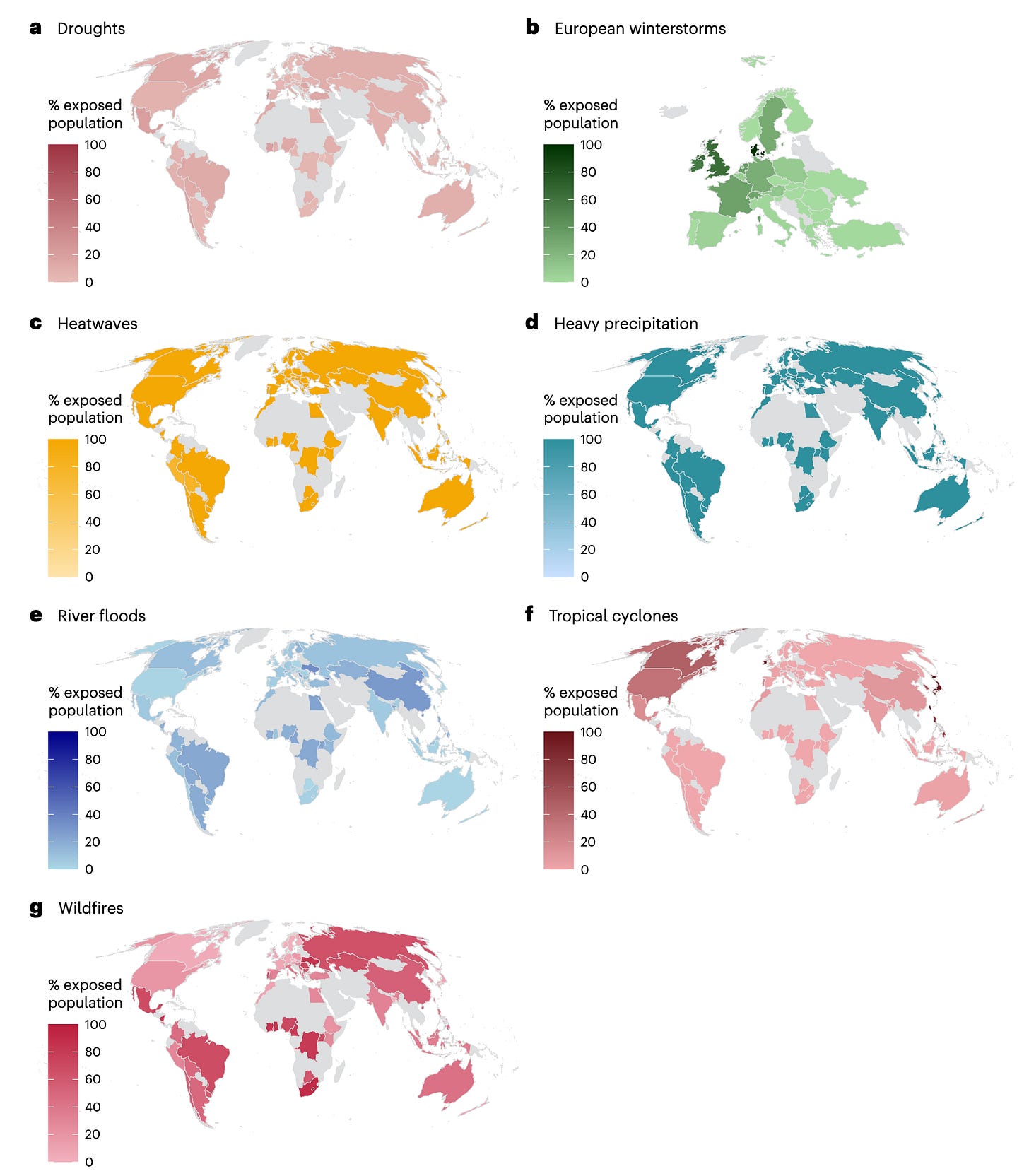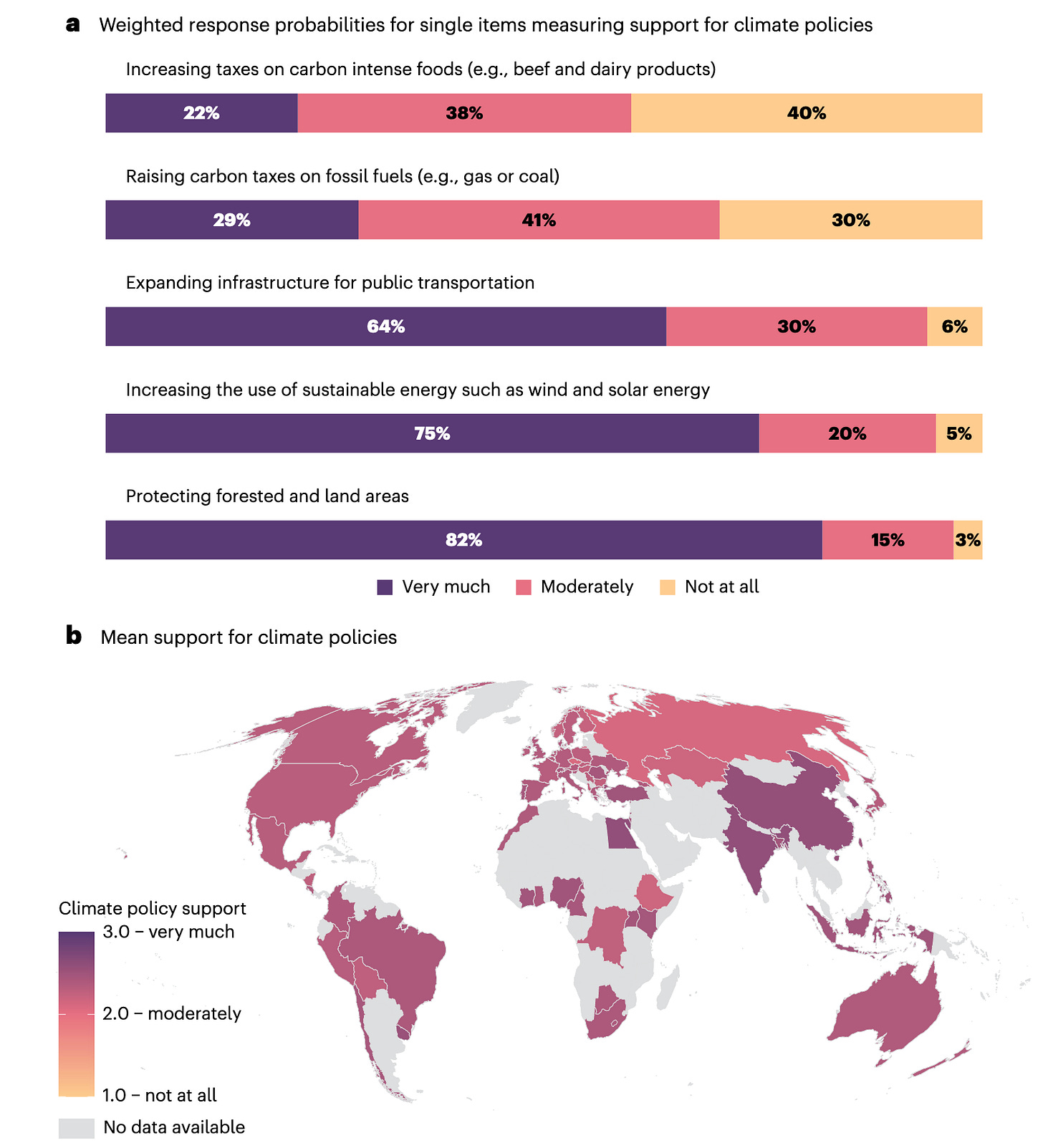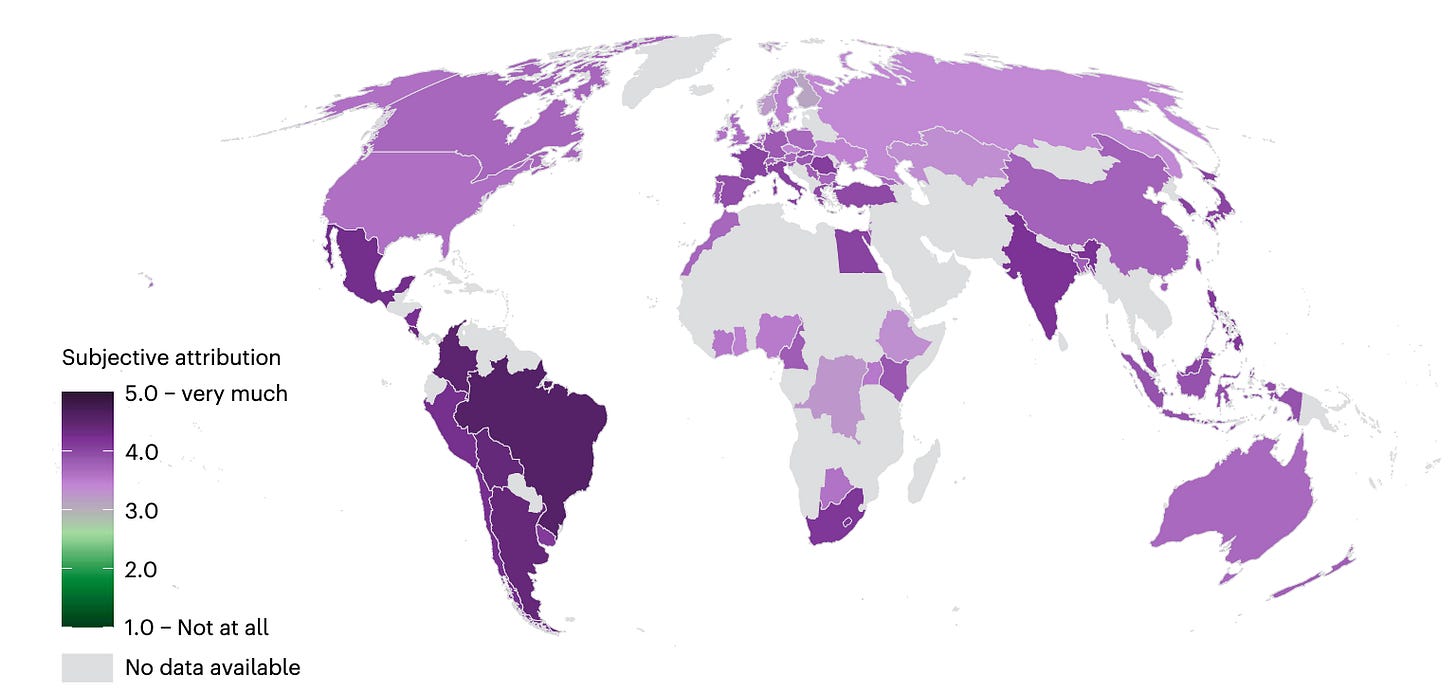When do extreme weather events change views on climate action?
Turns out it involves more than just experiencing events

I've been thinking a lot about extreme events lately. I'm currently revising a manuscript on the impacts of extreme climatic events on freshwater biodiversity. Hopefully we'll see it through the review process in the next few months.
But extreme events aren't just something we write academic papers about. They're hitting home for people around the world. The horrific impact of flash flooding in Texas recently is just one example of many — more than 3,600 flash flood warnings have been issued already this year in the US.
The most visible impact of these events is on human communities. The North of the South Island of Aotearoa New Zealand was hammered by three massive rainfall events in the space of a couple of weeks recently. These poor people have had to clean up the aftermath of flood after flood. There's only so much people can take.
Is this the new normal? I sure hope not. But climate projections suggest it might be.
We're likely to see a greater frequency of what we now consider extreme events. Depending on where you are in the world, floods, droughts, heatwaves, and cyclones are set to get more intense, more frequent, and change in other ways, like in when they arrive or how long they last. A recent paper showed that heatwaves increase in their duration with every degree of temperature increase.
This uncertainty, not just in how often, but also in when and where these events strike, makes them hard to plan for, and all too easy to downplay.
I've written about this topic in an earlier piece, outlining how extreme floods have increased with climate change — a trend set to continue.
But all this got me thinking. At what point do people change their minds about climate change? At what point do people get fired up and want to see action? When is enough enough? How many denied insurance claims? How many cleanups? Is experiencing multiple extreme floods, droughts, fires enough to convince people that change is needed?
Part of the problem is that climate change often feels distant. It's psychologically distant — it's happening somewhere else, to someone else, at some time in the future. It's easy to put out of our minds and in the too-hard-basket.
So it's not surprising at times that there's been a lack of action. But the rise of extreme events like these makes it harder to put it out of our minds. It's hard to turn a blind eye on these things when they regularly show up uninvited.

So the question is: does living through these events actually drive public support for climate action?
A recent paper in Nature Climate Change1 helps to answer that question.
Using large-scale natural and social science data from nearly 72,000 people across 68 countries, they wanted to know: does living through extreme events — like floods, fires, or heatwaves — make people more likely to support climate policies?
Importantly, they weren't just asking whether folks have experienced events like floods, fires, and heatwaves, they also wanted to know whether they thought climate change caused or worsened them. Most importantly, though, they were interested in whether that belief made them more likely to support climate policy.

The answer? It depends. But exposure alone wasn't enough. Just living through an event didn't mean they supported climate policy.
What was important was whether they believed climate change had a role in it (“subjective attribution”). Overall, their results suggest that if people subjectively attributed extreme events to climate change, these events could facilitate support for five climate policies: increasing taxes on carbon-intense foods, raising taxes on fossil fuels, expanding infrastructure for public transportation, increasing the use of sustainable energy, and protecting forested and land areas.
So, it's not just the experience that matters, it's how people interpret these experiences.

But the results get even more interesting. We scientists love a statistical interaction – where one driver mediates the effect of another. (I’ll save you from complex statistical figures.)
What they found is that for heatwaves and tropical cyclones, the greater the population size exposed to events, the more they supported climate policy, but only for those people with high subjective attribution (and less so for intermediate rates). By contrast, for floods, droughts and wildfires, those with higher subjective attribution were less dependent on exposure to events in terms of their support for policy.
As the authors suggest, this may reflect the fact that for floods, droughts and wildfires, local-scale mitigation feels more feasible — like increasing levee size to mitigate flood risk or better fire management regimes. But for heatwaves and tropical cyclones? They feel out of our hands, requiring global climate interventions. So it's a trade-off between local and global action.2
Conclusions
So to sum up, merely being exposed to extreme weather events isn't enough on its own to increase climate policy support. Individuals need to believe they're linked to climate change.
And, look, as I've mentioned before, I don't think scaremongering is the best way to drive action. We need to share the facts, openly and honestly, while cultivating messages of hope. That means helping people understand what they're experiencing, and that there are ways forward.
Climate change is here — it's not just a distant future threat. Yes, many of these impacts are locked in, but the severity of them aren't. We can fight to minimise the damage.
That's a fight worth every ounce of effort we have.
And when things seem insurmountable, take things bird by bird, step by step, problem by problem.
Take care out there,
Jono
PS: If you're feeling overwhelmed and want to take a little action each week, come and join in the chat. I've started something called the One action a week movement, where folks are sharing their own actions, whether tiny or large and creating a sense of community and shared action.
Many of us feel paralysed by the scale of the climate and biodiversity crises. The current political climate only makes it worse. It’s hard to believe our individual efforts matter at times.
But small, achievable actions can create momentum, particularly when done collectively.
I want to leverage the power of community here. There's a lot of passionate people in this group. We can learn from each other and build each other's actions up!
Rather than acting as lone individuals shouting into the void, what if we built a movement instead?
One small action each week. Done together. Shared. Tracked. Celebrated.
Check it out here (click below):
Cologna et al.. 2025. Extreme weather event attribution predicts climate policy support across the world. Nature Climate Change. DOI: 10.1038/s41558-025-02372-4.
There's one major caveat worth mentioning — it’s also possible that the causal arrow runs the other way. That is, people who already support climate policies are more likely to subjectively attribute these events to climate change. It's a bit of a chicken-and-egg situation.




People also have to believe there is an increase in extreme weather events. The number of times I have heard people say "it always gets this hot in summer," or something similar, and you can show them hard evidence, they shrug and repeat: every summer has been like this for as long as i can remember (no, it hasn't- but they will never be convinced). Floods? "Well, its because people are building on floodplains" - and there's a rant against the authorities allowing that (the same people will complain about the red tape restricting building, and government overreach). You can show them record flood data, that older homes have also been inundated, but no - its a recent phenomenon because of government policies, bad decisions etc. Mention climate change and you get sneered at.
Bushfires? Well, its all these people who want to live close to nature who are the problem. We've ALWAYS had fires, and we get a rant about the fire of '37, which proves climate change is false, because it was just as hot back then. And i have spoken to people who live in communities affected by these issues and STILL they repeat the same mantra.
The only thing I will say is that if you prod a bit, you find they all rely on the same (or very similar) media sources. And that tells us a lot about why people can have their heads in the sand even when looking out the window shows them there is a problem.
This was a very thought provoking post Jono. It's interesting how people perceive climate change whether they have been exposed to it or not and we can feel overwhelmed by the enormity of it all. I agree with you completely about how individually we can all make small changes for the greater good. It's the small things, changes in our own dividual behaviour that can make a difference, for example, riding a bike to work if you can. I'm sure there are loads of great climate saving initiatives being put in place, small and large, but I feel we just don't hear enough about them. Bad news always seems to travel faster than good news unfortunately.